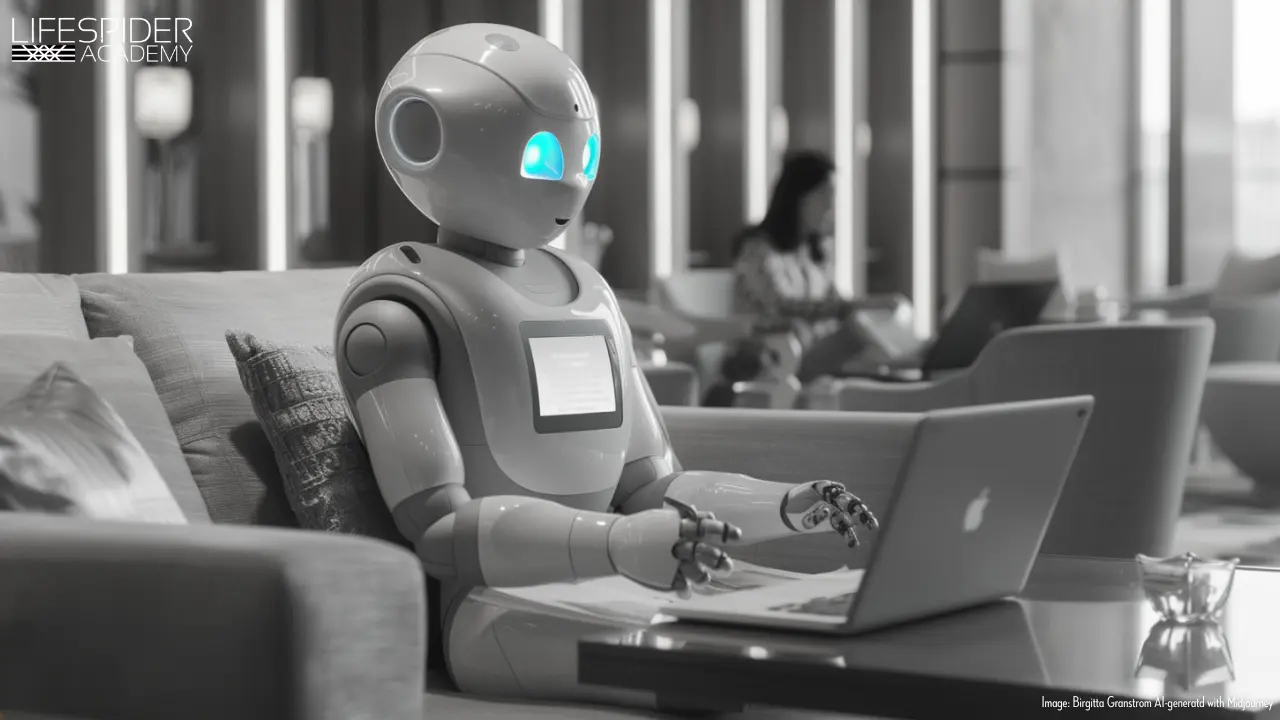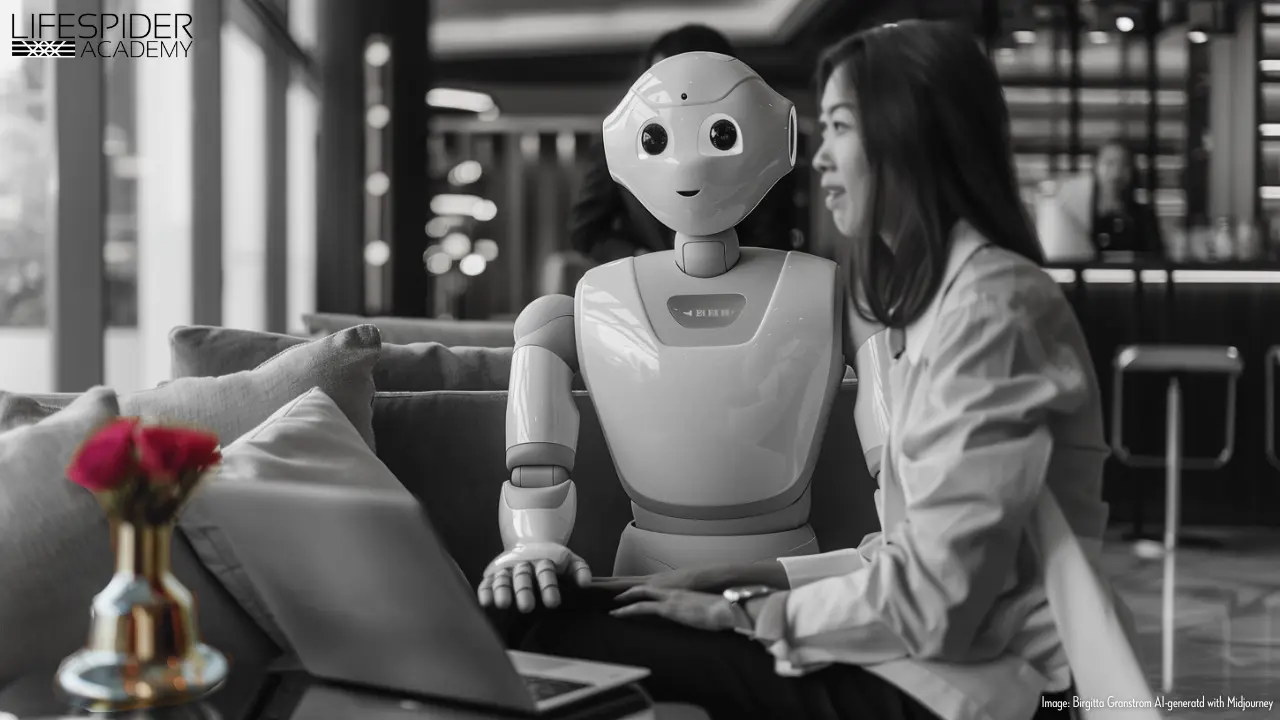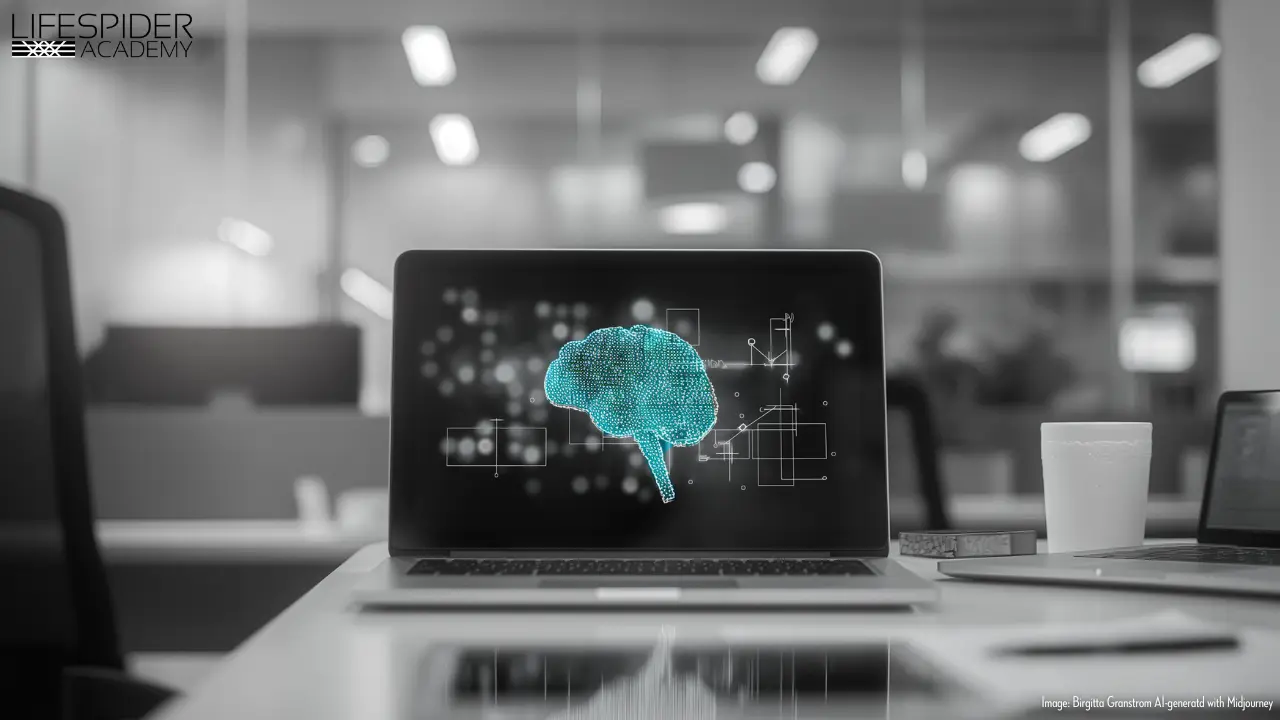Simplifying the Future of Coaching in an AI-Dominated World

The blog post presents a compelling vision for integrating artificial intelligence into the coaching industry. It navigates the balance between embracing technological advancements and preserving the essence of coaching as a profoundly human endeavor. The post explores innovative concepts and calls for ethical guidelines and collaborative development, laying a foundational perspective on the future of coaching in an AI-enhanced world.
While rich in insight and forward-thinking, the post significantly contributes to the dialogue on the evolution of coaching. It encourages readers to consider the transformative potential of AI in extending the reach and effectiveness of coaching services.
Embracing the Future of Coaching with AI

Our journey forward is evident as we stand at the crossroads of coaching and artificial intelligence. "The Future of Coaching & AI" aims to explore how AI can magnify the impact of coaching, making it more personalized, accessible, and effective. This initiative isn't about replacing the human touch in coaching but enriching it with AI's capabilities to create more adaptive and insightful coaching experiences.
My Vision and Mission
I envision a collaborative effort that brings together experts from diverse fields—coaching, psychology, education, and technology—to redefine coaching in the 21st century. Our mission focuses on three pillars:
- Identifying Trends: Understanding current and future directions in coaching and AI.
- Developing Guidelines: Establishing ethical practices for AI integration in coaching.
- Creating Solutions: Innovating scalable AI-powered solutions to enhance coaching outcomes.
This project underscores our belief in a future where human coaches are empowered with AI tools, broadening their reach and deepening their impact. It's about augmenting human capabilities, not replacing them.
Why It Matters
Discussing the future of coaching and AI is crucial. It prepares us for a rapidly evolving landscape where AI can augment the coaching process. By engaging in this dialogue, we contribute to the growth of coaching as a profession and ensure our practices remain relevant and impactful in an AI-enhanced world.
The Rise of GPT-4 in AI
ChatGPT and other advanced language models have ushered in a significant leap in artificial intelligence. These models make interactions more natural and intuitive. GPT-4 demonstrates intelligence that complements and, in some ways, surpasses human input. GPT-4, in particular, excels at understanding complex questions and providing insightful answers, thereby enhancing our collaboration with machines.
Conventional input-output dynamics are transcended by GPT-4's nuanced understanding and adaptability. It showcases an ability to grasp the underlying intentions of even ambiguously posed questions. It offers insights that might not have been explicitly sought but are deeply relevant.
The Reverse Turing Test Challenge for Coaches

The inclusion of AI in coaching brings forth the concept of the reverse Turing test, as proposed by Kiersten Dierhof. The Turing test, initially introduced by Alan Turing, assesses whether a machine can hold a conversation indistinguishable from a human's.
If a coach's interactions are similar to those of a machine, it could suggest a lack of genuine intelligence or personalization in their approach.
The reverse Turing test compels coaches to distinguish their methods from AI. The actual value of coaching lies in empathy, creativity, and comprehension that go beyond what algorithms can imitate.
The Call for Coaches
It calls for coaches to emphasize their unique human qualities, like empathy, creativity, and flexibility, to help clients expand beyond their limits.
With AI and robotic coaching in play, human coaches can focus on guiding clients to uncover their purposes, which demands surpassing their boundaries and imagination.
A Human Coach's Uniqueness
A coach's intuition and ability to perceive shifts in energy go beyond rigid frameworks that not even a robot coach, with all its capabilities, can recognize.
AI can Humanize Coaches
In summary, the Reverse Turing Test Challenge invites coaches to reflect on their coaching approach, emphasizing the aspects that make them distinctly human. Doing so enhances their value and creates more impactful client coaching experiences.
AI Coaches for Unbiased Questions
AI can ask questions without bias, leading to better self-reflection and insights. When combined with experienced coaches, AI becomes a powerful tool, making coaching more personalized and effective.
Raising Coaching Standards with AI

Integrating AI into coaching offers a chance to improve quality and effectiveness. Blended AI and human skills can create a transformative coaching experience, but it also requires a higher standard of coach education and certification.
The Essence of Professional Coaching with AI
AI in coaching isn't just about technology. It's about enriching coaching with more profound understanding and empathy. The future promises a society where coaching, powered by AI, helps everyone reach their full potential.
The Misconception of Becoming a Coach
Becoming a coach is often misunderstood. It requires in-depth knowledge and training, not just personal experience or interest. Just like flying a plane, coaching needs specialized skills.
The Risk of AI Diluting Coaching Quality

As AI evolves, it may dilute coaching too much, allowing those without fundamental coaching skills to appear competent. It's vital to distinguish actual coaching from superficial coaches and AI solutions.
Conclusion: From Personal Experience to Professional Coaching
Personal experiences can inspire, but professional coaching needs more. It requires training, ethics, and dedication. As AI enhances coaching, let's remember the power of human connection and professionalism in fostering growth and resilience.
Appreciating coaching doesn't mean you can coach; much like enjoying music, it doesn't make you a conductor. Good coaching requires understanding people and guiding them to achieve their goals.
Overcoming personal challenges is admirable but doesn't automatically qualify one as a coach. Professional coaching demands formal training and a commitment to ethical standards and client well-being.
Join us in Shaping the Future of Coaching.

I invite you to join us in shaping this future. Explore how AI can transform coaching and participate in creating a better world through this synergy.
The Quick Fix Audio Event
I've started the Quick Fix audio event to highlight the true essence of coaching: asking the right questions rather than giving advice. This approach reminds everyone that coaching is about guiding self-discovery and empowerment.
For more information and to join this exciting journey, please visit our website, attend our audio events, follow us on Linkedin, or send me a message.
As we navigate the integration of AI in coaching, let's remember the core of our profession: human connection, guided by professionalism and a commitment to growth.
Birgitta Granstrom
Founder of LifeSpider System
The future of coaching, enriched with AI, promises a more empowered society where every individual's potential can be fully realized.
Subscribe to LifeSpider News, a publication focusing on Personal Evolution, Future Leadership, and empowerment to manifest your ideas that contribute to a better world. It is designed for "The Weird Ones," who have the potential to make a significant change and solve urgent global problems.






